Westside Observer
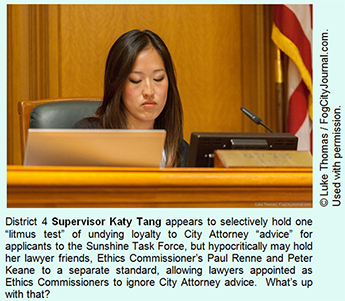 June 2014 at
www.WestsideObserver.com
June 2014 at
www.WestsideObserver.comDéjà vu: Jerry-Built Appointments to the Sunshine Task Force
Board of Supervisors Continue Sunshine Retaliation
Article Printer-friendly PDF file
Westside Observer
 June 2014 at
www.WestsideObserver.com
June 2014 at
www.WestsideObserver.com
Déjà vu: Jerry-Built
Appointments to the Sunshine Task Force
Board of Supervisors
Continue Sunshine Retaliation
by Patrick Monette-Shaw
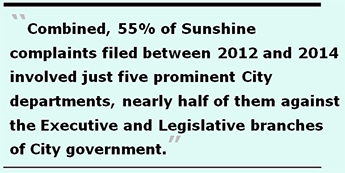 In
2012, the City Hall Family also wanted to quell complaints against
the Mayor's office, which racked up 10 complaints between 2012
and 2014, for 5.1% of complaints following installation of the
toadies.
In
2012, the City Hall Family also wanted to quell complaints against
the Mayor's office, which racked up 10 complaints between 2012
and 2014, for 5.1% of complaints following installation of the
toadies.
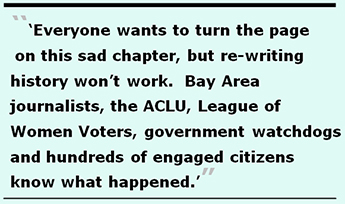 The
mainstream media have failed to report this ugly affair and the
Board of Supervisors failure to make appointments to this watchdog
body.
The
mainstream media have failed to report this ugly affair and the
Board of Supervisors failure to make appointments to this watchdog
body.
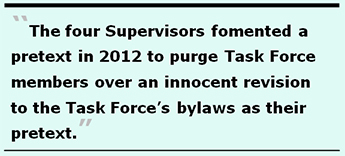 San
Franciscans should again be alarmed by continued efforts of the
Board of Supervisors to rig appointments to the Sunshine Ordinance
Task Force (SOTF), a quasi-judicial body charged with adjudicating
disputes between citizens versus City officials and City departments
regarding access to public meetings and public records.
San
Franciscans should again be alarmed by continued efforts of the
Board of Supervisors to rig appointments to the Sunshine Ordinance
Task Force (SOTF), a quasi-judicial body charged with adjudicating
disputes between citizens versus City officials and City departments
regarding access to public meetings and public records.
On May 15, when the Rules Committee met to consider new appointments to the Sunshine Ordinance Task Force, there were then 13 applicants for the 11 seats. That’s when Katy Tang took up the drumbeat asking for more “diversity” on the Task Force.
By May 30, when the Board of Supervisor’s June 5 agenda was first posted on-line, suddenly a new “diversity” applicant — one Mr. Obia Rambo, a rising African-American supplicant in San Francisco’s political circles — suddenly applied for appointment to the Task Force, but quickly withdrew from consideration before June 5, perhaps after he may have learned of the time commitments of volunteers serving on what is essentially, a citizen’s oversight body. Rambo may not have wanted to devote so much time away from his other pursuits.
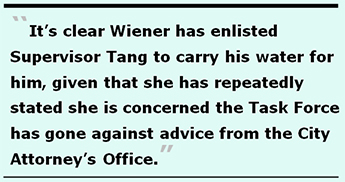 Only
three applicants were advanced and recommended for re-appointment
to the full Board of Supervisors on May l5 — David Pilpel,
Louise Fischer and Todd David — the most questionable of
all applicants, given their history, credentials, and competency
while serving on the SOTF between 2012 and 2014. The remaining
10 applicants who were not advanced on May 15, but delayed for
another round of consideration, were all better qualified to serve
in the best interest of the public’s right to know laws and
the Sunshine Ordinance.
Only
three applicants were advanced and recommended for re-appointment
to the full Board of Supervisors on May l5 — David Pilpel,
Louise Fischer and Todd David — the most questionable of
all applicants, given their history, credentials, and competency
while serving on the SOTF between 2012 and 2014. The remaining
10 applicants who were not advanced on May 15, but delayed for
another round of consideration, were all better qualified to serve
in the best interest of the public’s right to know laws and
the Sunshine Ordinance.
As observers remember, in 2012 the purge of Task Force members by Board president David Chiu — with an assist from Chiu’s cohorts, Supervisors Scott Wiener and Mark Farrell — used bogus allegations that previous Task Force members had violated the City’s charter in adjusting the Task Force’s voting threshold.
Fast forward to May 27, 2014, when once again Wiener raised the same bogus allegations to the full Board of Supervisors, and raised a question about “hold-over” appointments of Task Force members who were not re-appointed, but continue to serve until replacements are appointed. Deputy City Attorney Jon Givner, who advises both the Board’s Rules Committee and the full Board, appears to have replied to Wiener without hesitation that the Task Force did not come under any laws under the Charter with regard to holdovers. Thus, if the SOTF is not governed by the holdover rules, then the same may apply for all other rules including the voting threshold, which the Task Force may have been fully within its legal rights to change in 2011, but which is incessantly used against them to justify the 2012 purge, and is the basis for Supervisor Tang’s new litmus test of Task Force applicants.
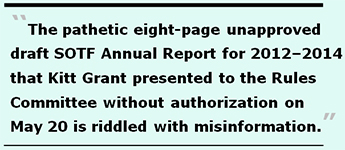 Astute
observers suspect that Chiu may have been preventing Task Force
appointments for as long as possible so as not to stain his June
3 primary election for California’s Assembly. Chiu and others
seeking election in November 2014 may fear that if certain applicants
are appointed to SOTF membership, their behind-closed-door antics
and lack of transparency may be exposed and reported in the media,
explaining why Chiu may want to stack SOTF appointments to preserve
his secrecy.
Astute
observers suspect that Chiu may have been preventing Task Force
appointments for as long as possible so as not to stain his June
3 primary election for California’s Assembly. Chiu and others
seeking election in November 2014 may fear that if certain applicants
are appointed to SOTF membership, their behind-closed-door antics
and lack of transparency may be exposed and reported in the media,
explaining why Chiu may want to stack SOTF appointments to preserve
his secrecy.
As the Westside Observer reported in “Who Killed Sunshine?” (July 2012), Supervisor Scott “The Tinkerer” Wiener single-handedly killed open government by shutting down our local Sunshine Task Force for six months and five days in 2012, leaving San Franciscan’s without any citizen oversight of access to public meetings and access to public records, and leaving City Hall wide open for corruption to run rampant.
Along comes déjà vu. Now Wiener, along with District 4 Supervisor Katy Tang and Board President David Chiu, appear to be staging a repeat of attempts to jerry-build appointments to all 11 seats on the Sunshine Task Force using whatever is handy, or whoever is malleable.
To support his false claim that the Sunshine Task Force had engaged in official misconduct of its own and had undermined transparency in government, Wiener failed to provide any evidence and lied at least four times during a full Board of Supervisors meeting on May 22, 2012.
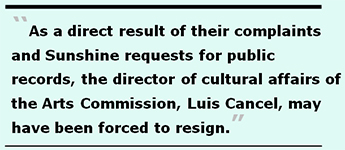 As
Dr. Derek Kerr noted in written public comments submitted to the
Board of Supervisors Rules Committee for its May 15, 2014 hearing
on new appointments to the Sunshine Task Force, two years ago
Supervisors Scott Wiener, David Chiu and Mark Farrell led a campaign
to purge members from the Sunshine Task Force in 2012. It’s
painfully clear that Supervisor Scott Wiener is continuing his
vendetta against the Sunshine Task Force again, two years later,
over the SOTF’s ruling in 2011 that he and three other Supervisors
had engaged in official misconduct regarding the withholding of
Park Merced amendments until just before voting on the Park Merced
development deal.
As
Dr. Derek Kerr noted in written public comments submitted to the
Board of Supervisors Rules Committee for its May 15, 2014 hearing
on new appointments to the Sunshine Task Force, two years ago
Supervisors Scott Wiener, David Chiu and Mark Farrell led a campaign
to purge members from the Sunshine Task Force in 2012. It’s
painfully clear that Supervisor Scott Wiener is continuing his
vendetta against the Sunshine Task Force again, two years later,
over the SOTF’s ruling in 2011 that he and three other Supervisors
had engaged in official misconduct regarding the withholding of
Park Merced amendments until just before voting on the Park Merced
development deal.
Wiener appears to remain clearly unhappy that his resume or curriculum vitae was besmirched by the Task Force’s official Order of Determination referring him to the Ethics Commission for official misconduct in 2011. Aspiring politicians such as Wiener and David Chiu clearly don’t want an “official misconduct” charge blotching their records, and their “legacies.”
The 2012 Prextext to Purge SOTF
The four Supervisors fomented a pretext in 2012 to purge Task Force members over an innocent revision to the Task Force’s bylaws as their pretext. Wiener went so far as to request a biased and surreptitious audit of the Task Force to justify the purge. Compliant candidates — such as Louise Fischer and Todd David — were recruited at the last minute, resulting in stacking the Task Force with members whose commitment to open government laws were more controllable. In 2012, candidates nominated by the Society of Professional Journalists, the League of Women Voters, and New America Media, were dismissed or not appointed, along with then-incumbent SOTF member Bruce Wolfe, a highly-qualified candidate who was the sole applicant from the disabled community. Supervisor Farrell alienated many people, claiming he was merely seeking “fresh blood” for the Sunshine Task Force.
As a result of Wiener’s political vendetta, the Task Force couldn’t meet to conduct the business of citizens for over six months in 2012 because, lacking a disabled appointee, the SOTF would have violated the Sunshine Ordinance itself, had it continued to conduct business. Following the Great Purge of 2012, the Board of Supervisors never appointed a nominee from the Society of Professional Journalists to Task Force Seat #l reserved for a lawyer, because the City Hall Family did not want the Task Force to receive legal advice from anyone other than a Deputy City Attorney.
And as the Observer reported in “Wiener Out of Control” (September 2012), Wiener went after the Sunshine Task Force because he was clearly peeved that the Task Force had referred him — along with Board President David Chiu, Supervisor Eric Mar, and Supervisor Malia Cohen — to the Ethics Commission for official misconduct over the Park Merced development deal.
Wiener wrongly claimed on May 22, 2012 that the Task Force had exempted itself from the San Francisco Charter, and wrongly claimed the Task Force had said “How dare you shine sunlight on us?,” when the Task Force had never claimed any such thing. Wiener claimed he asked for an “audit” of the costs of compliance with the Sunshine Ordinance, when in fact he asked for a “survey.” Wiener also inflated the average number of times City employees had to attend hearings to resolve Sunshine complaints.
And on May 20, 2014, Wiener signaled he remains perturbed that members of the Sunshine Task Force “had a really problematic history in terms of violating the [City] charter,” when in fact the Task Force had just disagreed with advice from a low-level Deputy City Attorney. It’s clear Wiener has enlisted Supervisor Tang to carry his water for him, given that she has repeatedly stated she is concerned the Task Force has gone against advice from the City Attorney’s Office.
Flaws in the Glass: SOTF Annual Report
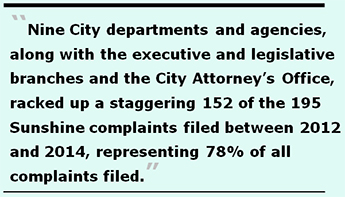 On
May 15, 2014 when the Rules Committee considered applicants to
the SOTF, Supervisor Norman Yee may have abused his discretion
by allowing former Task Force chairperson Kitt Grant to make a
presentation — with no notice on the Rules Committee agenda
indicating that any presentation was being scheduled. Ms. Grant
had by that point already resigned her seat on the Task Force
and no longer represented the SOTF, but was apparently invited
to make introductory remarks before the hearing got underway,
remarks that appeared designed to affect the Rules Committee’s
deliberations on new appointments to the Task Force.
On
May 15, 2014 when the Rules Committee considered applicants to
the SOTF, Supervisor Norman Yee may have abused his discretion
by allowing former Task Force chairperson Kitt Grant to make a
presentation — with no notice on the Rules Committee agenda
indicating that any presentation was being scheduled. Ms. Grant
had by that point already resigned her seat on the Task Force
and no longer represented the SOTF, but was apparently invited
to make introductory remarks before the hearing got underway,
remarks that appeared designed to affect the Rules Committee’s
deliberations on new appointments to the Task Force.
Grant presented her remarks not so much as a member of the public exercising her First Amendment rights to free speech, as she presented them in her former capacity as a member of the Sunshine Task Force. To the extent Grant passed herself off as speaking in her former official capacity, rather than as a private citizen, she, too, may have violated the same prohibition in the Board of Supervisors Statement of Incompatible Activities that applies to Task Force members, as just-reappointed Task Force member David Pilpel arrears to have violated, discussed below.
Remarkably, Grant essentially presented a draft version of the SOTF’s annual report for 2012–2014, which has not been approved yet by the full Sunshine Task Force.
We know her remarks were lifted, almost verbatim, directly from the unapproved Annual Report, because a subsequent public records request uncovered a “script” prepared for and used by the 65-year-old Rules chairperson, Supervisor Norman Yee, as a guide on how to conduct the hearing. The Script reads:
Although Yee cleverly didn’t read that part of the script into the audio recording of the hearing to alert the public of the source of data Grant presented, the script reveals Grant would be delivering an unauthorized, unapproved annual report without the consent of the full Task Force, and without any advance notice to the full Task Force that Grant was going to “leak” the draft annual report. Another problem is, Grant had already resigned and was no longer Chair of SOTF, and as noted, the draft Annual Report has not been approved by vote of Task Force members. It was clear she was there to bias and influence Rules Committee members by presenting inflammatory, and inaccurate information contained in the draft report.
Grant’s testimony before the Rules Committee appears to report almost verbatim, the draft version of the SOTF’s Annual Report that still has not been authorized, or approved.
Indeed, the draft Annual Report suggests that the SOTF appointees during the Great SOTF Purge of 2012 have not been as “efficient” as they wrongly boast being. Over their two-year terms, there should have been two separate annual reports. Instead, four of the Purge appointees — Ms. Grant, David Pilpel, Louise Fischer, and Todd David — have been so hell bent on holding Task Force meetings to the shortest amount of time period, given their busy private lives, that over their two-year terms, they’ve been unable to complete even a single annual report — the draft annual report Grant had no business presenting to Supervisor Yee until it had been approved by the full membership of SOTF.
Grant’s Flawed Annual Report Data
The pathetic eight-page unapproved draft SOTF Annual Report for 2012-2014 that Kitt Grant presented to the Rules Committee without authorization on May 20 is riddled with misinformation, in stark contrast to the Task Force’s 24-page Annual Report for 2010-2011 that was issued on January 31, 2012 by former Task Force chair Ms. Hope Johnson, a paralegal that many observers view as having been the most effective Task Force chairperson across its 20-year history.
Grant asserted only a handful of complainants file multiple Sunshine complaints. Between calendar years 2012 and 2014 (to date), there have been 195 Sunshine complaints filed, by a total of 65 complainants. Fully 17 of the 65 complainants filed more than one Sunshine complaint. While it is true that the 17 people who filed multiple complaints filed 147 — or 74% — of the 195 complaints, the 17 people are by no means “a small handful,” as Grant alleged.
Complaining that many requests come from just a few people is a red herring to distract from information often eventually revealed with persistence. People who file multiple complaints typically have good reason to do so and are determined to uncover the truth when suspicious City officials misbehave.
Take for example the complainant Grant bitterly complained had filed 28 complaints. That complainant — most probably Paula Datesh — had joined with another street artist, William Clark and his twin brother, in filing 40 complaints between 2012 and 2014 alone, and many other complaints prior to 2012, against the San Francisco Arts Commission. As a direct result of their complaints and Sunshine requests for public records, the director of cultural affairs of the Arts Commission, Luis Cancel, may have been forced to resign.
A San Francisco Bay Citizen article on June 29, 2011, reported that Sunshine Task Force member Rick Knee had stated “The Arts Commission staff has shown a pattern of dodging or evading public information requests, and when they do comply they might give some information that is not exactly what the requester asked for.” The Sunshine Ordinance Task Force submitted a letter to the Board of Supervisors — with a copy to Mayor Ed Lee — advising that City officials should give careful scrutiny to the San Francisco Arts Commission’s spending policies and practices, and to its requested budget for the forthcoming fiscal year. The Bay Citizen reported Knee didn’t recall the Task Force ever having sent a similar letter during his seven-year tenure on SOTF.
At the time, the media reported that Cancel had potentially made some personnel changes and a whistleblower complaint was filed against him for his frequent trips to his second home in Rio de Janeiro. After Cancel resigned, it’s not clear what became of an investigation of his activities as a senior member of the Arts Commission. San Francisco’s Civil Grand Jury reported that the City Controller had found improper transfers of funds and that the Street Artists Program needed better accounting practices. Both the Grand Jury Report and the Controller’s report sounded like sugar coating of improper handling, and potentially misappropriation of funds.
Or take the complainant Grant bitterly complained had filed 24 complaints across the three-year period, more than likely Ray Hartz, Jr. Hartz, along with Library User’s Association Executive Director Peter Warfield who has filed just six Sunshine complaints during the same time frame, helped expose along with former Task Force chairperson James Chaffee’s research assistance, that City Librarian Luis Herrera had failed to report to the Ethics Commission gifts from the Friends of the Library to the City Librarian on Herrera’s Form 700 Statements of Economic Interest over a three-year period. While the asleep-at-the-wheel Ethics Commission predictably took no action against Mr. Herrera wanting to help out members of San Francisco’s “City Hall Family,” California’s Fair Political Practices Commission did take action, fining Herrera for failing to disclose his gifts from the Friends of the Library.
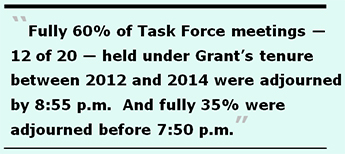 Grant implied that the complaints by the
“core” group of complainants are filed against a handful
of City departments, which may be untrue. Of the 195 Sunshine
complaints submitted between 2012 and 2014, they involved 56 City
departments, the legislative and executive branches, and a host
of various policy bodies. Grant completely withheld in either
the draft Annual Report, or in her oral remarks to Supervisors
Yee and Tang on May 15, that fully 16% — 31 complaints —
were filed against the Board of Supervisors, various Board subcommittees,
individually-named Supervisors, and the Mayor and various sub-entities
of the Mayor’s office. Clearly, members of the public are
very concerned by the antics of the legislative and executive
branches of City government.
Grant implied that the complaints by the
“core” group of complainants are filed against a handful
of City departments, which may be untrue. Of the 195 Sunshine
complaints submitted between 2012 and 2014, they involved 56 City
departments, the legislative and executive branches, and a host
of various policy bodies. Grant completely withheld in either
the draft Annual Report, or in her oral remarks to Supervisors
Yee and Tang on May 15, that fully 16% — 31 complaints —
were filed against the Board of Supervisors, various Board subcommittees,
individually-named Supervisors, and the Mayor and various sub-entities
of the Mayor’s office. Clearly, members of the public are
very concerned by the antics of the legislative and executive
branches of City government.
Another 9.2% — 18 complaints — of the Sunshine complaints were against the City Attorney, or City Attorney’s Office, who is the one offering inaccurate advice to a whole host of City departments on how to evade compliance with the Sunshine Ordinance. Grant left out these messy details, appearing to prefer to fawn before Yee and Tang.
In addition to the complaints filed against the executive and legislative branches and the City Attorney’s Office, there were another nine City departments and agencies — including the Arts Commission, City Controller, Community Housing Partnership, Department of Public Works, Municipal Transportation Agency, Planning Department, Police Department and Police Commission, Public Library and Library Commission, and the Recreation and Park Department — who along with the executive and legislative branches and the City Attorney’s Office racked up a staggering 142 of the 195 complaints filed between 2012 and 2014, representing 72.8% of all complaints filed.
Yet Grant wasted not one word on whether the Task Force has even bothered evaluating why just nine City agencies — plus the Office of the Mayor, various entities of Board of Supervisors, and the City Attorney’s Office — were responsible for the lion’s share of complaints and citizen’s concerns.
More of Kitt Grant’ Flawed Annual Report Errors and Omissions
First, Grant brazenly admitted that the Task Force has attempted to restrict hearing only about five Sunshine complaints per full Task Force meetings, a sure-fire way of creating a backlog of complaints heard within the required 45-day period after complaints are filed. Rather than efficiently hearing as many cases per meeting as possible, an artificial limit has been placed on how many will be considered during each meeting.
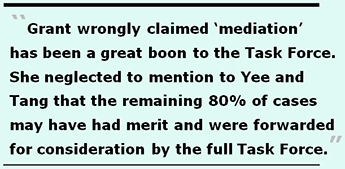 Grant
claims that in order to be “more efficient” the Task
Force limits its meetings to extend only until 9:00 p.m. or 10:00
p.m. But fully 60% of Task Force meetings — 12 of 20 —
held under Grant’s tenure between 2012 and 2014 have been
adjourned by 8:55 p.m. And fully 35% have been adjourned before
7:50 p.m. The goal of the Task Force’s “efficiency”
has been to start its meetings late, and end them early, potentially
in order to create more “efficiency” for Task Force
members to attend to their private lives, not to public service.
Grant
claims that in order to be “more efficient” the Task
Force limits its meetings to extend only until 9:00 p.m. or 10:00
p.m. But fully 60% of Task Force meetings — 12 of 20 —
held under Grant’s tenure between 2012 and 2014 have been
adjourned by 8:55 p.m. And fully 35% have been adjourned before
7:50 p.m. The goal of the Task Force’s “efficiency”
has been to start its meetings late, and end them early, potentially
in order to create more “efficiency” for Task Force
members to attend to their private lives, not to public service.
To be fair, the Task Force did extend four of its 20 meetings between 2012 and 2014 until between 10:00 p.m. and 11:35 p.m. Although those four late-hour meetings represent 20% of its meetings, by stark contrast the Task Force has adjourned before 8:00 p.m. 35% of the time. It’s not as if the late-hour adjournments aren’t offset by the early-hour adjournments.
More judicious middle-ground adjournments may have gone a long way towards clearing up the artificially-created complaint backlog, or hearing cases within the required 45-day window. Perhaps Grant didn’t want to bother Tang’s and Yee’s pretty little heads about this point.
Ms. Grant wrongly claimed “mediation” has been a great boon to the Task Force. She testified 15 complaints had been mediated in 2012, 17 in 2013, and 7 in 1014, for a total of 39 cases mediated — just 19.8%. She neglected to mention to Yee and Tang that the remaining 80% of cases may have had merit and were forwarded for consideration by the full Task Force.
She provided no detail on just how the cases had been mediated, whether in favor of the complainant or respondent, let alone a summary of how the cases were resolved. But a preliminary analysis of Sunshine Task Force Administrator reports for 2013 shows that of 89 cases reported as “mediated,” a total of 15 (16.9%) cases were “resolved” and disposed of during mediation, and another 15.7% (14 cases) were either closed or withdrawn, which may or may not have happened regardless of “mediation” interventions.
That leaves on the Administrator’s reports for 2013 that of 89 cases “mediated,” fully 68% were either advanced to a full Sunshine Task Force hearing, or were pending a decision about whether a hearing would eventually be held.
Grant completely failed reporting to Tang and Yee that Deputy City Attorney Jerry Threat had notified the Task Force as early as April 2013 that if complainants request a hearing, they are entitled to be granted one (discussed below), thwarting the very “mediation” Ms. Grant and SOTF Vice Chair Louise Fischer apparently felt entitled to force upon Sunshine complainants.
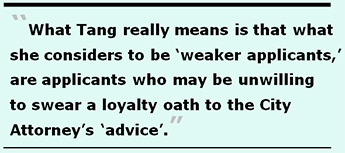 Then,
Ms. Grant complained about the backlog of cases, indicating there
are still a total of 61 cases backlogged from 2012 to 2014, fully
31% of all cases filed. She offered little in the way to justify
the backlog, and didn’t mention that prematurely adjourned
Task Force meetings may have contributed to the “efficiency”
problem.
Then,
Ms. Grant complained about the backlog of cases, indicating there
are still a total of 61 cases backlogged from 2012 to 2014, fully
31% of all cases filed. She offered little in the way to justify
the backlog, and didn’t mention that prematurely adjourned
Task Force meetings may have contributed to the “efficiency”
problem.
Grant also alleged that the Task Force lacks jurisdiction over many Sunshine complaints, but didn’t quantify, let alone describe, how many cases may be beyond jurisdiction of the Task Force. An analysis of how many of Sunshine complaints eventually heard by the Task Force is also underway, but not yet completed.
Ms. Grant Impliedd Sunshine Ordinance “Out of Date”
Grant not only alleged that the Task Force’s bylaws may be out of date, she also she implied the Sunshine Ordinance itself may be out of date. Later during the Rules Committee’s May 15 hearing, Ms. Fischer pretty much asserted the same thing.
The Sunshine Ordinance adopted in 1999 and subsequently amended by voters at the ballot box, is not out of date. It was drafted with the assistance of leading experts, including Peter Scheer of the California First Amendment Coalition, and Terry Francke of CalAware. Our Sunshine Ordinance is the strongest in the nation, and was used to help draft both San Jose’s and the City of Berkeley’s Sunshine ordinances. Our ordinance is a rock-solid ordinance that has survived the test of time for over 20 years.
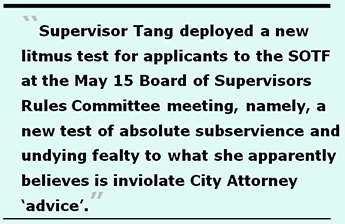 But
admittedly, the Ordinance may need an update to include a prohibition
of use by City officials of their personal e-mail addresses, and
private cell phones, neither of which existed 20 years ago when
the Sunshine Ordinance was first adopted. Times have changed with
the advent of technology, which even Supervisor David Chiu seems
all too eager to misuse to his advantage (see below).
But
admittedly, the Ordinance may need an update to include a prohibition
of use by City officials of their personal e-mail addresses, and
private cell phones, neither of which existed 20 years ago when
the Sunshine Ordinance was first adopted. Times have changed with
the advent of technology, which even Supervisor David Chiu seems
all too eager to misuse to his advantage (see below).
Katy Tang’s Appointee Litmus Test
Back in 2012, Mr. Wiener falsely claimed the Task Force purported to exempt itself from the San Francisco Charter. The Task Force had done no such thing, and it did not set out to purposefully ignore City Attorney advice. It just reached a different interpretation of the law. That’s not stopping Supervisor Katy Tang from now floating the dead-horse idea the Task Force had ignored City Attorney advice back in 2011.
In a San Francisco Bay Guardian blog posting by Steven T. Jones on May 20, Tang asserted she would personally “have liked to see stronger applicants” for current openings on the Sunshine Task Force. She claimed that 10 of the 13 applicants “didn’t seem to have a good understanding of the Sunshine Ordinance.” Tang also invoked an alibi that there wasn’t sufficient ethnic diversity among SOTF applicants.
But what Tang really means is that what she considers to be “weaker applicants,” are applicants who may be unwilling to swear a loyalty oath to the City Attorney’s “advice,” and may hold differing interpretations of applicable law.
Supervisor Katy Tang deployed a new litmus test for applicants to the SOTF at the May 15 Board of Supervisors Rules Committee meeting, namely, a new test of absolute subservience and undying fealty — a feudal tenant’s or vassal’s sworn loyalty to a lord — to what she apparently believes is inviolate City Attorney “advice.” This suggests SOTF applicants may be required to submit to and defer to whatever rotten “advice” is issued by whichever Deputy City Attorney is currently, or was previously, assigned to the Sunshine Task Force. Tang’s litmus test clearly violates the spirit of the Sunshine Ordinance, and may violate the law behind it.
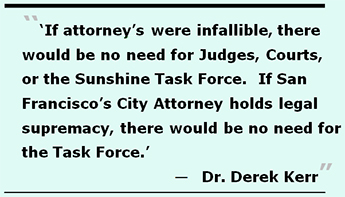 Tang’s
new litmus test appears to require applicants to swear a loyalty
oath to the City Attorney — as if he and his advice are 100%
infallible, 100% of the time — before she’ll grant her
seal of approval to any given SOTF candidate.
Tang’s
new litmus test appears to require applicants to swear a loyalty
oath to the City Attorney — as if he and his advice are 100%
infallible, 100% of the time — before she’ll grant her
seal of approval to any given SOTF candidate.
“Knowledgeable as attorneys are — whether City Attorneys or private attorneys — they are essentially advocates,” says Dr. Derek Kerr who was wrongfully terminated from City employment for whistleblowing. “If attorney’s were infallible, there would be no need for Judges, Courts, or the Sunshine Task Force. If San Francisco’s City Attorney holds legal supremacy, there would be no need for the Task Force, and all sunshine complaints could be adjudicated by the City Attorney. The trouble is, voters didn’t want that kind of ’efficiency’,” Kerr observes.
It’s not yet known whether Tang’s new litmus test will be applied to appointees of all City boards, commissions, and “transparency” oversight bodies, or whether the new test will only be selectively applied solely against the Sunshine Task Force.
What is known, is the San Francisco Bay Guardian reported May 20 that Tang asserted she won’t support any applicants seeking appointment to the SOTF who had taken part in a controversial vote in 2011 concerning a [probably legitimate] change to SOTF’s bylaws regarding the number of members present during any given meeting to rule on Sunshine complaint cases being heard.
More of Tang’s Nonsense
Supervisor Wiener is now using additional pretexts in 2014 to claim that the Task Force in 2011 had “violated” the charter. Newbie Supervisor Tang is also beating the same dead horse, telling the San Francisco Bay Guardian on May 20 that the Task Force had acted against the advice of the City Attorney and had defied the City Attorney’s Office. In 2012, Wiener wrongly asserted the Task Force had engaged in official misconduct.
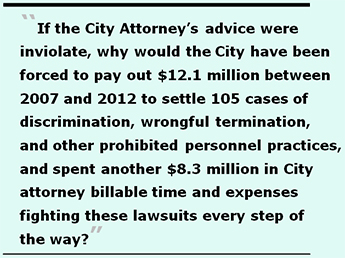 Now
in 2014, Ms. Tang claimed to the Guardian the Task Force
had engaged in “improper” conduct. Which is it? Improper
conduct? Or official misconduct? Either one are complete nonsense.
Now
in 2014, Ms. Tang claimed to the Guardian the Task Force
had engaged in “improper” conduct. Which is it? Improper
conduct? Or official misconduct? Either one are complete nonsense.
As testified to Ms. Tang during the Rules Committee’s hearing on May 15, 2014, the City Attorney’s “advice” is often wrong.
First, there’s the problem with City Attorney “advice” involving wrongful termination and discrimination cases brought by City employees against the City. If the City Attorney’s advice were inviolate, why would the City have been forced to pay out $12.1 million between 2007 and 2012 to settle 105 cases of discrimination, wrongful termination, and other prohibited personnel practices, and spent another $8.3 million in City attorney billable time and expenses fighting these lawsuits every step of the way, for a combined total of $20 million, had the City Attorney’s “opinions” not been found in the end to have been bad legal “advice”?
Second, why is the Board of Supervisors considering settling with Anshen + Allen / Stantec for just $15 million, after the City Attorney used his “advice” to file a lawsuit against the architectural firms alleging $70 million in design and construction errors during Laguna Honda Hospital’s (LHH) rebuild? If the City Attorney’s “opinion” and advice about the LHH lawsuit had been correct, why isn’t the City recovering the full $70 million in alleged defects? Could the City Attorney’s so-called “advice” concerning this lawsuit have been shot down by the Appellate Court as fatally-flawed legal advice? Our City Attorney? Wrong again?
Third, as recently as this Spring, some bonehead on the City’s bargaining team negotiating MOU’s (contracts) with City labor unions, pushed across the table a proposal to prohibit SEIU Local 1021 union members from being able to file discrimination complaints under local, state, and federal law, a proposal SEIU bargaining team members flatly rejected, since local law cannot “trump” federal anti-discrimination laws. Which of the City Attorney’s 174 lawyers in the 8177 to 8183 job classification codes that cost taxpayers $28 million in salaries alone in 2013 was boneheaded enough to even “advise” the City’s negotiating team that they could even “propose” eliminating federal anti-discrimination protections?
As if a mere labor agreement could somehow “trump” federal laws.
Does DHR have no Deputy City Attorney’s assigned to it well versed in labor law to know that such City Attorney “advice” or “opinions” should never have even been proffered, but once proffered made the City the newest laughingstock across America? What kind of “San Francisco values” would the City Attorney be espousing through legal advice to City labor negotiators with such a ridiculous proposal? Notably, although SEIU members rejected this rotten City proposal, nobody is proposing that the SEIU members had “ignored” City Attorney advice, or had “exempted” themselves from such crappy City Attorney advice.
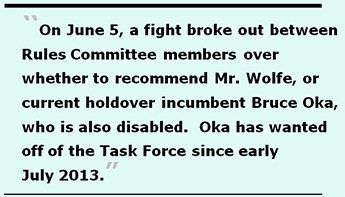 Highly
Qualified Candidates
Highly
Qualified Candidates
On May 15, the Board of Supervisors Rules Committee considered 13 applicants for the 11 seats on the Task Force. The pool of applicants included at least seven with impeccable credentials to serve:
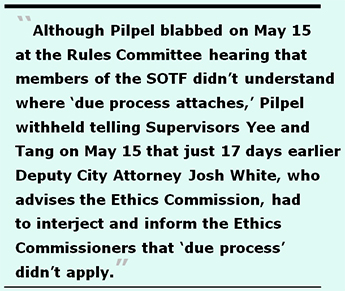 At
the conclusion of the Rules Committee’s May 15 hearing, only
three applicants — all toadies favored by Wiener to do his
bidding — were forwarded to the full Board of Supervisors
to jerry-rig composition of the Task Force. Shockingly, none of
the seven highly-qualified applicants were referred for appointment
to the full Board of Supervisors for consideration on May 20,
although on June 5 five of them finally secured recommendations
from the Rules Committee.
At
the conclusion of the Rules Committee’s May 15 hearing, only
three applicants — all toadies favored by Wiener to do his
bidding — were forwarded to the full Board of Supervisors
to jerry-rig composition of the Task Force. Shockingly, none of
the seven highly-qualified applicants were referred for appointment
to the full Board of Supervisors for consideration on May 20,
although on June 5 five of them finally secured recommendations
from the Rules Committee.
Three Hand-Picked Toadies Advance
On May 15, the Rules Committee divided the agenda item, forwarding three applicants to the full Board of Supervisors, postponing recommending the remaining 10 applicants to the eight remaining seats on the Task Force. On May 20, the full Board of Supervisors passed, and appointed, the three applicants referred to them by the Rules Committee.
Just two members of the Rules Committee — Supervisors Yee and Tang, since Supervisor Campos was out of town — ended up recommending to the full Board of Supervisors stacking the SOTF with three fawning candidates who had answered “Yes” to Tang’s new litmus test question about blind obedience to City Attorney “advice.” The three nominees recommended by Rules were approved by the full Board of Supervisors on May 20, and are now pending appointment by the Mayor, include:
SOTF Incumbent David Pilpel
Re-appointed to SOTF during the Purge of 2012, Pilpel has resumed his role carrying water for City officials named in Sunshine complaints heard by the SOTF. Pilpel is notorious for researching arcane issues in order to find exculpatory reasons to let City officials named as respondents in Sunshine complaints off of the hook, at the expense of complainants. Pilpel seeks to preserve secrecy in City government. He certainly is not an open government or Sunshine “hero.”
He was appointed in 2012 to help City officials wiggle out of Sunshine violations, and his service made him a shoe-in for re-appointment in 2014. But as just one example of why the Rules Committee should not have reappointed him involves Pilpel’s penchant for showing up at Ethics Commission hearings — lacking any authority to do so — to scuttle deliberations of Ethics Commissioners involving Sunshine complaints referred to Ethics for enforcement.
Pilpel’s Qualificatins Presentation During the May 15 Rules Hearing
Pilpel testified on May 15 that he’s on his third nonconsecutive term on the SOTF, which would be six years, but said he’s served for ten-and-a-half years out of the 20 years the Task Force has existed. It’s unclear whether Pilpel has a problem with basic math.
Although he claims he supports meaningful public participation and open government, he looks for “practical solutions” with City agencies. Pilpel asserted the Task Force is not perfect, and he is interested in having fewer complaints brought to the Task Force.
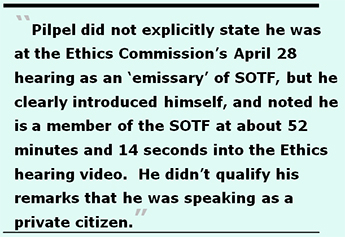 He
testified that he’s less interested in resolution of Sunshine
complaints — more than likely music to the ears of Rules
Committee members considering his re-appointment — and would
rather the Task Force be more proactive. Pilpel testified that
he wants, and would like, the Task Force to be more involved in
legislation going before the Board of Supervisors and legislators
in Sacramento, even though the Sunshine Task Force was not created
to focus on legislation.
He
testified that he’s less interested in resolution of Sunshine
complaints — more than likely music to the ears of Rules
Committee members considering his re-appointment — and would
rather the Task Force be more proactive. Pilpel testified that
he wants, and would like, the Task Force to be more involved in
legislation going before the Board of Supervisors and legislators
in Sacramento, even though the Sunshine Task Force was not created
to focus on legislation.
Pilpel claims he has proposed changes to the SOTF bylaw procedures — which changes have neither been discussed in open meetings of the Task Force during the past two years, nor adopted — and wants to focus on “things that matter,” rather than focusing on adjudicating complaints, that by inference he apparently doesn’t believe matter. He testified that he believes portions of the Sunshine Ordinance need to be rewritten.
For her part, Supervisor Tang noted that because Pilpel was seeking re-appointment, she wanted to ask him the same question about the SOTF complying with the Deputy City Attorney who staffs the task force, and how much Pilpel values the attorney’s role in conjunction with the Task Force itself, in terms of opinions and advice the City Attorney may provide to Task Force members.
Pilpel responded by asserting he absolutely values Deputy City Attorney’s opinions and understands fully the role of the City Attorney under both the Sunshine Ordinance and the City Charter, particularly Charter Section 6.102. He asserted the Task Force is subject to the Charter in terms of board and commission voting requirements [although Pilpel may be completely wrong on this point]. He acknowledged that a complaint the Task Force sent to the Ethics Commission last month was sent back because the Task Force had failed to name the right person, and it may happen again next month. Pilpel asserted that the Task Force has not understood where due processes “attaches.” Had to be music to Tang’s ears.
But there’s a small problem: Although Pilpel blabbed on May 15 at the Rules Committee hearing that members of the SOTF didn’t understand where “due process attaches,” Pilpel withheld telling Supervisors Yee and Tang on May 15 that just 17 days earlier when Pilpel raised the “due process” issue during a Sunshine complaint hearing before the Ethics Commission, Deputy City Attorney Josh White, who advises the Ethics Commission, had to interject and inform the Ethics Commissioners that “due process” didn’t apply. Pilpel appears to have misled both the Ethics Commissioners, and 17 days later, members of the Board of Supervisors Rules Committee. Pilpel creatively forgot to mention to the Rules Committee that DCA White had dismissed the idea that “due process” had been applicable, and kept spouting the “due process” nonsense even after DCA White advised Ethics Commissioners that Pilpel was barking up the wrong tree.
It appears it is Pilpel himself who doesn’t understand due process. And he also appears not to understand that the only laws the SOTF is charged with enforcing are the Sunshine Ordinance and by extension violations of California’s Public Records Act. This appears just one way in which Pilpel goes fishing for exculpatory excuses to let City Officials — in this case Recreation and Parks Department head Phil Ginsburg — off of the hook on allegations of willful misconduct.
Pilpel also appears to have creatively withheld from telling the Ethics Commission on April 28 that he, Pilpel, had, in fact, seconded a motion during the Task Force’s September 4, 2013 meeting to continue hearing complaint number 12-058 against Recreation and Park Department’s Phil Ginsburg (RPD’s department head) to its October 2 meeting in order to submit and provide adequate notice to Ginsberg that he was being requested to attend on October 2. The motion passed 7 to 0 — including Pilpel’s affirmative vote — with two Task Force members absent from the September 4 meeting. Pilpel absolutely had to have known — given that he had seconded the motion on September 4 — that Ginsburg had, in fact, been afforded due process “notice” and that the Task Force had not deprived Ginsburg of due process. Pilpel appears to have intentionally misled Ethics Commissioners and the Board of Supervisors on this point.
Potential Violation of the Board of Supervisors Statement of Incompatible Activities?
On May 29, Dr. Derek Kerr posted a germane comment about Pilpel’s shenanigans to former San Francisco Bay Guardian Bruce Brugmann’s blog article titled “The anti-sunshine gang intensifies its attacks on the Sunshine Ordinance Task Force in City Hall” posted earlier on May 29.
 Dr.
Kerr commented on SFBG’s blog:
Dr.
Kerr commented on SFBG’s blog:
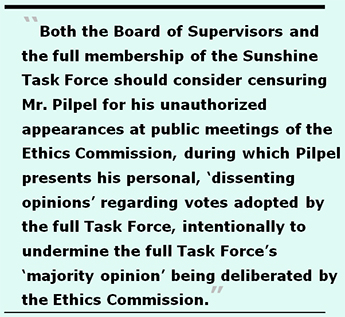 Pilpel
did not explicitly state he was at the Ethics Commission’s
April 28 hearing as an “emissary” of SOTF, but he clearly
introduced himself, and noted he is a member of the SOTF at about
52 minutes and 14 seconds into the Ethics hearing video, when
he introduced his public comments saying “David Pilpel. SOTF
member.” He didn’t qualify his remarks that he was speaking
as a private citizen.
Pilpel
did not explicitly state he was at the Ethics Commission’s
April 28 hearing as an “emissary” of SOTF, but he clearly
introduced himself, and noted he is a member of the SOTF at about
52 minutes and 14 seconds into the Ethics hearing video, when
he introduced his public comments saying “David Pilpel. SOTF
member.” He didn’t qualify his remarks that he was speaking
as a private citizen.
The Ethics Commission had not invited Pilpel to its April 28 meeting in order to make a formal presentation about a case on the Commission’s agenda that day. By inference, it was clear Pilpel was deliberately trying to make himself look good, tattling on his fellow SOTF members in order to make them look bad. Everything he reported to Ethics was insider information about a matter the Ethics Commission was discussing. Pilpel was not authorized to speak on behalf of the full Task Force to present his personal “minority opinion.”
The timing of Pilpel’s tattling to Ethics just 17 days before SOTF appointments were to be considered by the Board of Supervisors Rules Committee on May 15 appears to be more than just mere coincidence in timing. He may have wanted to paint a picture of other SOTF members in order to make them look bad prior to appointment consideration at Rules.
Indeed, both the Board of Supervisors and the full membership of the Sunshine Task Force should consider censuring Mr. Pilpel for his unauthorized appearances at public meetings of the Ethics Commission, during which Pilpel presents his personal, “dissenting opinions” regarding votes adopted by the full Task Force, intentionally to undermine — and adversely impact — the full Task Force’s “majority opinion” being deliberated by the Ethics Commission for enforcement. Pilpel may feel he is entitled to engage in this type of subterfuge by virtue of his seat on the Task Force.
Pilpel is not authorized to present his personal opinions under the guise of his SOTF membership regarding a concluded SOTF Order of Determination referring a given Sunshine complaint referred to Ethics for enforcement, during testimony to Ethics as any sort of “emissary” from SOTF.
The Statement of Incompatible Activities (SIA) for San Francisco Board of Supervisors, Clerk of the Board, Youth Commission, and Sunshine Ordinance Task Force unequivocally prohibits Pilpel from acting as any sort of “emissary” from the SOTF.
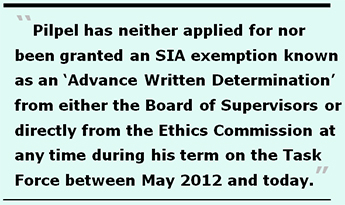 The
Board of Supervisor’s SIA applicable to Sunshine Task Force members
states in Section IV, Restrictions on Use of City resources, City
Work-product and Prestige, Sub-Section C, Use of Prestige of the
Office, paragraph 3, “Holding Oneself Out, Without Authorization,
as a Representative of the Board, Clerk of the Board, Youth Commission
or [Sunshine] Task Force”:
The
Board of Supervisor’s SIA applicable to Sunshine Task Force members
states in Section IV, Restrictions on Use of City resources, City
Work-product and Prestige, Sub-Section C, Use of Prestige of the
Office, paragraph 3, “Holding Oneself Out, Without Authorization,
as a Representative of the Board, Clerk of the Board, Youth Commission
or [Sunshine] Task Force”:
This Board of Supervisor’s SIA is adopted under the provisions of San Francisco Campaign and Governmental Conduct Code (“C&GC Code”) Section 3.218. Engaging in activities prohibited by a governing SIA may subject an officer or employee to discipline, up to and including possible termination of employment or removal from office, as well as to monetary fines and penalties. All City employees and appointees to City boards, commissions, task forces, and advisory bodies are required to re-read their applicable Department’s unique SIA’s annually.
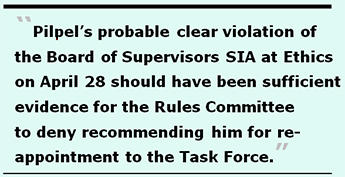 Pilpel
must surely be aware of this annual requirement, and that he is
prohibited from holding himself out as a member of SOTF at Ethics
Commission meetings, since neither the SOTF nor the Board of Supervisors
have authorized him to do so.
Pilpel
must surely be aware of this annual requirement, and that he is
prohibited from holding himself out as a member of SOTF at Ethics
Commission meetings, since neither the SOTF nor the Board of Supervisors
have authorized him to do so.
The SIA does provide that Task Force members may request an exemption to SIA requirements in writing, by submitting a description either to the Board of Supervisors or directly to the Ethics Commission of proposed activities a member might want to be exempted from, and an explanation of why such activity would not be incompatible under the governing SIA. Any such written request must describe the proposed activity in sufficient detail for the decision-maker to make a fully informed determination whether it is incompatible under this Statement.
Pilpel has neither applied for nor been granted an SIA exemption known as an “Advance Written Determination” from either the Board of Supervisors or directly from the Ethics Commission at any time during his term on the Task Force between May 2012 and today. The Board of Supervisors confirmed on June 2 that Pilpel has never applied for an advance written determination, and the Ethics Commission confirmed on Friday, June 6 that it, too, has no record of Pilpel ever submitting, or having been granted, an advance written determination request from Ethics.
Pilpel’s probable clear violation of the Board of Supervisors SIA at Ethics on April 28 should have been sufficient evidence for the Rules Committee to deny recommending him for re-appointment to the Sunshine Task Force, and sufficient evidence that the full Board of Supervisors should not have re-appointed him on May 20. But the full Board of Supervisors did re-appoint Pilpel, despite what appears to be a potential violation of the SIA governing Task Force members.
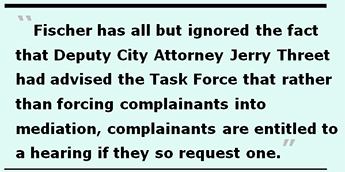 SOTF
Incumbent Louise Fischer
SOTF
Incumbent Louise Fischer
Ms. Fischer’s apparent sole qualification for appointment appears to be her involvement and possible membership in the Alice B. Tolklas Democratic Club, a political club under the thumb of Supervisor Wiener, the lead architect along with Board President David Chiu of the 2012 Purge of the Sunshine Task Force. She was brought in to help out Wiener in 2012, and has done nothing on the Task Force in her first two years to warrant re-appointment in 2014.
Indeed, her folksy style as evidenced by her presentation at the Rules Committee on May 15 reminds this author of the folksy style of former U.S. Presidential candidate Sarah Palin that clearly belied Palin’s intelligence quotient.
Fischer’s Qualificatins Presentation During the May 15 Rules Hearing
Fischer was all over the map in a rambling presentation of her qualifications on May 15 that made little sense, and demonstrated little justification for re-appointment to the Task Force. Supervisor Yee had to ask her to wrap up her rambling when she clearly exceeded time limits.
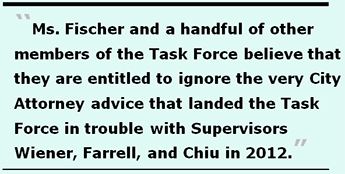 Fischer
testified that she is currently the acting chairperson of the
Task Force, since former chair Kitt Grant has resigned completely.
In her folksy style, Fischer claims she “knows how the sausages
are made.”
Fischer
testified that she is currently the acting chairperson of the
Task Force, since former chair Kitt Grant has resigned completely.
In her folksy style, Fischer claims she “knows how the sausages
are made.”
Fischer claims her first question to Sunshine complainants is whether they received whatever documents they had requested, and if not, she then asks the respondents why they didn’t provide the materials. Observers who regularly attend Sunshine Task Force meetings report that they have rarely heard Fischer ask any such line of questioning, so she may have bamboozled Supervisors Yee and Tang on May 15. She may have made this claim up, as she rambled along.
Anticipating Supervisor Tang’s question about the City Attorney’s role, Fischer said the first thing the new members did in 2012 was to reverse the six-vote rule because it was a violation of the City charter. She claimed it was ironic that the SOTF is in charge of enforcing open records rules, but had violated a rule in the Charter. Fischer suggested that by combining similar complaints into one hearing, the Task Force can become more “efficient.” Echoing Kitt Grant’s opening presentation of the un-approved draft Sunshine Task Force annual report, Fischer also complained about three complainants who file too many complaints.
Fischer says she would like to see changes to the SOTF’s bylaws, and believes mediating complaints should be the first solution the Task Force considers to lessen the number of cases the Task Force needs to hear during its regular meetings.
Fischer — and a handful of other Task Force members — has all but ignored the fact that Deputy City Attorney Jerry Threet had advised the Task Force that rather than forcing complainants into mediation, complainants are entitled to a hearing if they so request one.
As early as April 16, 2013, then administrator of the Sunshine Task Force, Angela Ausberry announced that “in an attempt to mediate and stave off hearings before the full Sunshine Ordinance Task Force,” the respondents in this author’s Sunshine complaint number 13-021 involving the Department of Public Health should respond to a mediation attempt within five business days to avoid having a hearing before the Task Force. After this author responded to Ausberry the next day on April 17, 2013 that a full hearing, not mediation, was being requested, DCA Threet advised Ausberry — and by extension, advised the full Task Force — also on April 17, 2013, that “If the Complainant [requests] a full hearing [before the full Task Force], they are entitled to [request and be granted] it.”
That has not stopped the current SOTF Administrator, Victor Young, nor stopped either Ms. Fischer or the full Task Force, from trying to force complainants to enter into mediation by dissuading them from obtaining a hearing by the full Task Force, despite City Attorney “advice” to the contrary. Apparently the double-standard involving selectively ignoring City Attorney advice has been completely lost on the hapless, albeit folksy, Louise Fischer.
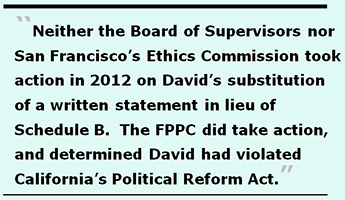 It
appears that Ms. Fischer and a handful of other members of the
Task Force believe that they are entitled to ignore the very City
Attorney advice that landed the Task Force in trouble with Supervisors
Wiener, Farrell, and Chiu in 2012. And stupidly, Supervisors Tang
and Yee recommended Fischer for re-appointment to the Task Force
on May 15, and the full Board of Supervisors in fact re-appointed
Fischer to her seat on May 20, despite Fischer’s apparent
willingness to ignore Deputy City Attorney Threet’s professional
advice, by forcing complainants into mediation, in a completely
misguided attempt at feigned improvement to the Gods of “Efficiency.”
It
appears that Ms. Fischer and a handful of other members of the
Task Force believe that they are entitled to ignore the very City
Attorney advice that landed the Task Force in trouble with Supervisors
Wiener, Farrell, and Chiu in 2012. And stupidly, Supervisors Tang
and Yee recommended Fischer for re-appointment to the Task Force
on May 15, and the full Board of Supervisors in fact re-appointed
Fischer to her seat on May 20, despite Fischer’s apparent
willingness to ignore Deputy City Attorney Threet’s professional
advice, by forcing complainants into mediation, in a completely
misguided attempt at feigned improvement to the Gods of “Efficiency.”
On May 15, Fischer also testified that she still wants to limit how many times similar complaints can be heard over and over, apparently even if doing so would violate the due process rights of members of the public to file complaints as they see fit, again ignoring DCA Threet’s advice that if complainants request a hearing, they are entitled to one, even in Sunshine complaints involving similar issues. That potentially means several separate hearings, one for each complaint.
Notably, Supervisor Tang asked no questions of Fischer, even though Tang had indicated she would ask the same questions of each candidate seeking re-appointment. And if Tang’s litmus test demands undying fealty to City Attorney advice, it’s more than a tad ironic that Fischer was granted re-appointment, despite being oblivious to Threet’s advice.
SOTF Incumbent Todd David
Before getting to Todd David’s May 15 Rules Committee presentation regarding his qualifications to be re-appointed to the SOTF, let’s get out of the way two issues Mr. David failed to address on May 15, which Supervisors Yee and Tang must have surely known about, but chose to ignore.
Todd David’s Form 700 Failure and an FPPC Warning Letter
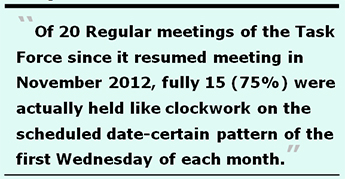 A
chronology of David’s appointment to the Task Force in 2012
is in order.
A
chronology of David’s appointment to the Task Force in 2012
is in order.
Supervisor Scott Wiener pulled Todd David out of a rabbit hat during the May 22, 2012 full Board of Supervisors meeting, kicking Bruce Wolfe off of the Sunshine Task Force island. David had not applied through customary avenues, but to Wiener, directly. Mr. David appeared to have had no qualifications to serve on the Sunshine Task Force back in 2012, and his 2012 application listed no qualifications to serve.
In 2012 Mr. David’s Form 700, Statement of Economic Interests — a document required as part of SOTF’s application process — failed to include the pre-printed form, Schedule B, Interests in Real Property. Instead, he submitted a written statement in lieu of Schedule B in which he neglected to report the appraised value of a multi-family residential property he owns at 384 Eureka Street appraised in 2012 at $2.1 million, and neglected to report rental income he receives from the multi-unit property.
Notably, although the Rules Committee only considered David’s typed statement in 2012, rather than the required Schedule B, the Rules Committee did not recommend Mr. David for appointment to the Task Force in 2012. It was Wiener who chose to substitute Todd David during the subsequent May 22, 2012 meeting of the full Board of Supervisors in place of the Rules Committee’s recommended disabled candidate, Bruce Wolfe.
Although David applied for a single seat in 2012 (SOTF Seat 9), Wiener’s substitution assigned Mr. David to Seat 8, the seat the Board of Supervisors had historically advertised as reserved for a physically-disabled member.
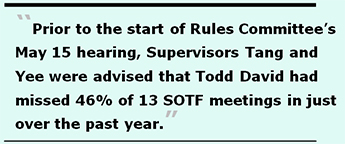 Neither
the Board of Supervisors nor San Francisco’s Ethics Commission
took action in 2012 on David’s substitution of a written
statement in lieu of Schedule B. So a complaint was filed with
the California Fair Political Practices Commission (FPPC) regarding
Mr. David’s substitution in lieu of Schedule B. The FPPC
did take action, and determined David had violated California’s
Political Reform Act by failing to disclose his interests in real
property. The FPPC issued a warning letter to Mr. David on August
22, 2012 after he submitted an amendment including the proper
Schedule B.
Neither
the Board of Supervisors nor San Francisco’s Ethics Commission
took action in 2012 on David’s substitution of a written
statement in lieu of Schedule B. So a complaint was filed with
the California Fair Political Practices Commission (FPPC) regarding
Mr. David’s substitution in lieu of Schedule B. The FPPC
did take action, and determined David had violated California’s
Political Reform Act by failing to disclose his interests in real
property. The FPPC issued a warning letter to Mr. David on August
22, 2012 after he submitted an amendment including the proper
Schedule B.
But because David was then seeking, and continues to seek funding of over $4 million in City funds for his pet project, the Noe Valley Town Square, Wiener engineered appointing David to the Task Force. Since then, both the Mayor and Wiener have been reported in the press as being supportive of the Noe Valley Town Square raid of the Open Space fund.
Is Todd David Campaign Manager for Supervisors Scott WIener’s and Eric Mar’s “Suagary Sode Tax Ballot Measure”?
ChooseHealthSF is the “sugary soda” tax measure working its way to the November San Francisco ballot hoping to raise $30 million in funding to benefit kids and parks, and DPH by imposing a tax on sugary-laced sodas popular with children. Supervisors Scott Wiener and Eric Mar have been working on placing such a tax measure before the voters.
But even before it may — or may not — be officially accepted as a Board of Supervisors-sponsored ballot measure later in July, it’s a little disconcerting that Mr. David’s Linked-In page says:
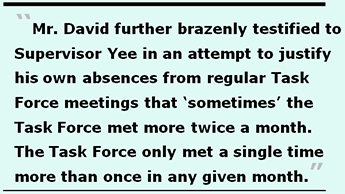 Googling
the phrase “Todd David and ChooseSFHealth,” Google reports
that Mr. David is not merely listed as a “Campaign Consultant”
as he may have artfully reported to the Elections Department.
Instead, Google reports on his Linked-In profile that Mr. David
is ChooseHealthSF’s ballot “campaign manager,”
not merely a campaign “consultant.” Hopefully, the Elections
Department and the Ethics Commission will note Mr. David’s
possible duplicity shielding that he’s really a campaign
manager carrying yet more water for Supervisor Wiener, not a mere
consultant.
Googling
the phrase “Todd David and ChooseSFHealth,” Google reports
that Mr. David is not merely listed as a “Campaign Consultant”
as he may have artfully reported to the Elections Department.
Instead, Google reports on his Linked-In profile that Mr. David
is ChooseHealthSF’s ballot “campaign manager,”
not merely a campaign “consultant.” Hopefully, the Elections
Department and the Ethics Commission will note Mr. David’s
possible duplicity shielding that he’s really a campaign
manager carrying yet more water for Supervisor Wiener, not a mere
consultant.
What we have here, is the cart before the horse. David claims to be campaign manager for a ballot measure that is not yet placed on the ballot.
David may clearly want a portion of the soda tax to reach the Recreation and Park Department, or at minimum to reach recreation programs for busy parents such as himself who have trouble attending SOTF meetings due to their child-rearing responsibilities, recurring SOTF meetings on the first Wednesday of each month be damned.
Or, Mr. David may be hoping some of the sugary-soda tax revenue will reach the group edMatch that he founded to raise matching funds for schools, a group with its own spotty track record and lack of public accountability regarding how, or even whether, it has actually disbursed matching funds to schools.
And at question may be the propriety of City Board and Commission appointees being involved with ballot measures as a named ballot campaign member, given restrictions on “electioneering” by City employees and agents of the City. If nothing else, it illustrates that Mr. David gets involved in partisan politics, and may not be an unbiased member of the Sunshine Task Force.
Todd David’s Absence Record and False Testimony About SOTF Meeting Schedules
It’s totally sad that Supervisors Breed and Yee were snookered — by believing — both Todd David and other Sunshine Task Force members who may have misled both Supervisors that the Task Force was not meeting regularly. Observers wonder whether that was with SOTF Chairperson Kitt Grant’s and Co-Chair Louise Fischer’s help.
In the absence of checking the Task Force’s by-laws (which clearly state the Task Force’s regular meeting pattern), all Yee and Breed — or their respective legislative aides earning $100,000 a year in salaries — had to do to ascertain the veracity of Task Force member Todd David’s outrageous absentee record during his first two-year term on the Task Force was key in 20 meeting dates of the Task Force into Microsoft Excel. Right-mouse clicking on a column of data in Excel permits formatting of dates to display as both day of the week + date of the month, which shows clearly that the SOTF has a pattern of meeting on Wednesday’s.
Then Breed and Yee would have known that the Task Force has a set date-specific pattern for its regular meetings on Wednesdays. By comparing a printout of Excel’s automatic formatting of dates to that age-old device known as a hardcopy printout of monthly calendars, Yee and Breed would have quickly learned that full Task Force meetings are typically held like clockwork on the first Wednesday of each month. Yet neither Breed nor Yee sought to verify independently bullshit claims raised by Todd David and his backers that the “Regular Meeting” dates were chaotic.
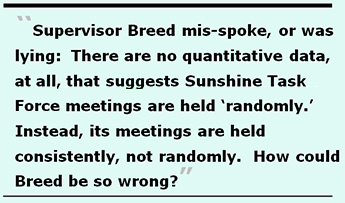 Indeed,
of 20 Regular meetings of the Task Force since it resumed meeting
in November 2012, fully 15 (75%) were actually held like clockwork
on the scheduled date-certain pattern of the first Wednesday of
each month. Of five regular meetings cancelled and rescheduled,
four of the five were due to conflicts with official City holidays.
The four cancelled and rescheduled meetings represent 20% of the
20 meetings. The remaining regular meeting cancelled was due to
a lack of quorum.
Indeed,
of 20 Regular meetings of the Task Force since it resumed meeting
in November 2012, fully 15 (75%) were actually held like clockwork
on the scheduled date-certain pattern of the first Wednesday of
each month. Of five regular meetings cancelled and rescheduled,
four of the five were due to conflicts with official City holidays.
The four cancelled and rescheduled meetings represent 20% of the
20 meetings. The remaining regular meeting cancelled was due to
a lack of quorum.
Prior to the start of Rules Committee’s May 15 hearing, I advised both Supervisor Tang and Supervisor Yee that I would be testifying that Todd David had missed 46% of 13 SOTF meetings in just over the past year documented in the SOTF’s absence records, documentation of which I provided to Rules supervisors Yee and Tang prior to the start of the hearing.
After Mr. David presented his qualifications to serve on the Task Force, Supervisor Yee raised a follow-up question to Mr. David regarding David’s attendance record. Blatantly, Mr. David responded that the Task Force had been unable to meet for “a couple of months” following the appointment of Task Force members in 2012, and “then we were kind of were shifting around [meeting] dates.” This is patently untrue for a number of reasons.
First, it was not just a “couple of months,” as David falsely testified that the Task Force had been shut down. It was fully six months — fully half a year — between May 2 and November 7, 2012 when the Task Force was forced into not meeting, due to being out of compliance with having a disabled member appointed to the Task Force, a feat engineered by Supervisors Wiener, David Chiu, and Mark Farrell.
Second, Mr. David signaled his upcoming absences by skipping attending the very second meeting of the Task Force (December 5, 2012) after it resumed meetings on November 7, 2012. The first meeting David skipped was scheduled for the typical pattern of the Sunshine Task Force’s first-Wednesday-of-the-month date-certain scheduled meetings, and his first absence was not because — as David falsely asserted — that the Task Force had begun “shifting around meeting dates.” Nor was that first absence due to David’s further false allegation to Supervisor Yee’s follow-up question during the Rules hearing May 15 that there was no way to “easily predict when regular meetings would be scheduled.”
What part of the regular, recurring pattern of full Task Force meetings regularly held the first Wednesday of each month enumerated in SOTF’s by-laws did Mr. David not understand? The Task Force has clearly not shifted its Regular Meeting dates at all, since Mr. David was sworn into office.
Mr. David could have “predicted” when he would be required to attend regularly-scheduled meetings, had he just read and understood the Task Force’s bylaws. It appears he may not have read them. Had he read them, then he may have been able to negotiate with his wife assumption of child-rearing duties he claims were more important to him than attending meetings at which members of the public expected he would faithfully attend. Todd David’s claim I had a sick child my wife couldn’t deal with doesn’t cut it with members of the public who believe oversight bodies have a special obligation to protect the public interest, the very “transparency” Supervisor Tang claims is important to protect the public.
Then David further brazenly testified to Supervisor Yee in an attempt to justify his own absences from regular Task Force meetings that “sometimes” the Task Force met more twice a month. The Task Force only met a single time more than once in any given month. The full Task Force has, as shown in the table below, held just seven “Special Meetings” since it resumed meeting on November 7, 2012. Of the seven Special Meetings, only one actually involved the full Task Force meeting more than once per month, since subcommittee meetings have never counted towards meetings of the full Task Force.
The full Task Force has only met twice in a single month just once, the second month after Purge appointees were sworn in, in 2012.
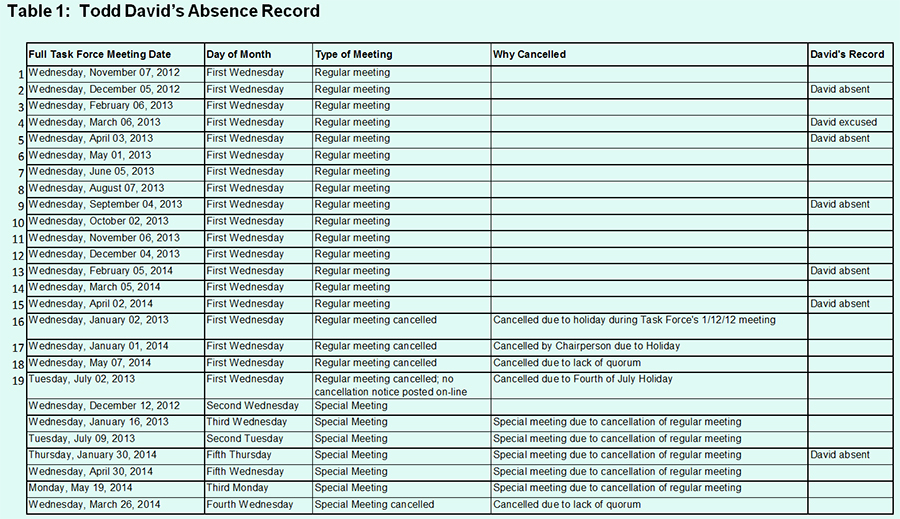
Five of the Special Meetings were replacement dates for five cancelled Regular Meetings. Just two of the Special Meetings were to have been for an additional meeting in a given month, but one of the Special Meetings was subsequently cancelled due to a lack of quorum. The full Task Force has only met more than once in any given month a single time — in November 2012 — for a single “additional meeting” during the 19-month period since it resumed meetings in November 2012.
The full Task Force has not met more than once a month after the new Purge appointees were installed in 2012 — except once in December 2012 during the second month of their tenure. Since then, during the intervening 18-month period they have made no sustained effort to meet more than once a month. Subcommittee meetings don’t count, as noted, since there have always been subcommittee meetings during the 20-year existence of the Task Force.
The Task Force has made no effort to do so again, since December 2012. So much for the nonsense that the 2012 Purge appointees tried to clear up Sunshine complaint backlogs by holding multiple meetings in any given month.
So-called “Special Meetings” of the Task Force have posed no undue burden on Task Force members, as Task Force Chair Kitt Grant, Co-Chair Fischer, and member Todd David may have knowingly misrepresented to Supervisors Yee, Tang, and Breed. It’s complete nonsense. Shame on Yee, Tang, and Breed for believing any such nonsense.
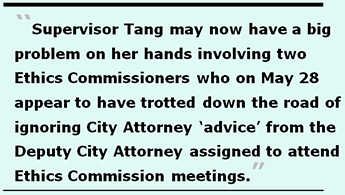 Then
Mr. David may have falsely testified (under oath?) to Supervisor
Yee during the Rules hearing that his (David’s) absences
were due to being unable to attend meetings that were rescheduled
to other dates. Of the five cancelled meetings rescheduled, Mr.
David attended four, illustrating he was actually able —
not unable, due to child care responsibilities — to attend
rescheduled meetings. Indeed, Mr. David’s additional six
(of seven absences) all occurred on Regular Meeting dates that
all followed the same recurring, and clearly predictable, pattern
on the first Wednesday of each month.
Then
Mr. David may have falsely testified (under oath?) to Supervisor
Yee during the Rules hearing that his (David’s) absences
were due to being unable to attend meetings that were rescheduled
to other dates. Of the five cancelled meetings rescheduled, Mr.
David attended four, illustrating he was actually able —
not unable, due to child care responsibilities — to attend
rescheduled meetings. Indeed, Mr. David’s additional six
(of seven absences) all occurred on Regular Meeting dates that
all followed the same recurring, and clearly predictable, pattern
on the first Wednesday of each month.
That Supervisor Yee accepted David’s lame, false testimony during the Rules hearing on May 15, and then subsequently at the full Board of Supervisors hearing on May 20, is one problem. Another problem is that Supervisor Yee further asserted that after asking around, “different [Task Force members] confirmed that they moved committee meeting dates [around],” and “didn’t have regular meetings on a [date-]certain calendar date.” That’s complete nonsense, as Yee’s staff could have easily researched for him and included in the “script” prepared to help bumbling Yee conduct the Rules Committee hearing on May 15.
For her part, Supervisor Breed also brazenly stated during the May 20 full Board of Supervisors hearing that her “understanding” was that “they [the Sunshine Task Force] don’t [sic] have a regular meeting day and regular meeting [dates] changes [sic] consistently … for example — ’we [the Board of Supervisors] meet every Tuesday,’ …. And [regular SOTF meetings] are very random, which makes it difficult for some [Task Force] members to attend.” Supervisor Breed mis-spoke, or was lying: There are no quantitative data, at all, that suggests Sunshine Task Force meetings are held “randomly.” Instead, its meetings are held consistently, not randomly. How could Breed be so wrong?
Were Breed, Tan, Wiener, and Yee so tied up in meetings with SOTF “lobbyists” David, Fischer, and Grant, that the four Supervisors had no time left over to independently very the veracity of the lobbyists’ false claims?
Additionally, Deputy City Attorney Jon Givner, who advises multiple Board of Supervisors and its various subcommittees, claimed he didn’t know what the Task Force’s recurring meeting schedule is. Givner claimed he wasn’t familiar enough with the Task Force’s bylaws to know what the regular date-certain meeting schedule is. (Givner, if he were worth his salt, could have easily and quickly Googled and pulled up the Task Force’s bylaws to ascertain the Task Force’s recurring regularly-scheduled meeting pattern during the Rules Committee’s May 15 hearing, but chose not to.)
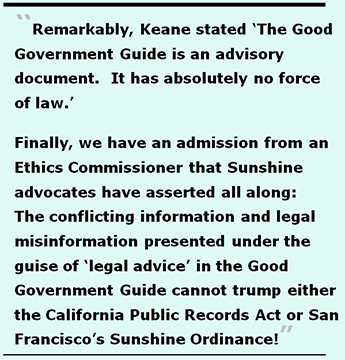 This
is comical precisely because Article V, Section 2 of the Task
Force’s bylaws specifically states that the SOTF’s meetings
that were previously held on the fourth Tuesday of each month
were moved to the first Wednesday of each month. Not only did
Givner fail to read this key provision in SOTF’s bylaws,
it appears so, too, did Member Todd David.
This
is comical precisely because Article V, Section 2 of the Task
Force’s bylaws specifically states that the SOTF’s meetings
that were previously held on the fourth Tuesday of each month
were moved to the first Wednesday of each month. Not only did
Givner fail to read this key provision in SOTF’s bylaws,
it appears so, too, did Member Todd David.
Just as Member Pilpel may not have read and understood the Board of Supervisors Statement of Incompatible Activities that prohibits him from attending other City oversight body meetings and potentially misrepresenting that he is speaking as an “emissary,” rather than speaking as a private citizen.
The table above disproves the misinformation presented by Todd David and his supporters. The data presented involve data that Supervisors Yee, Tang, and Breed or their respective staff’s could have easily researched and uncovered, as the Westside Observer has — without much effort. The three Supervisors and Supervisor Wiener have much more resources at their disposal to investigate policy matters of concern to San Franciscans, and to San Francisco’s Board of Supervisors, than do this reporter or the Westside Observer.
After all, data in the table above was gleaned from meeting postings on SOTF’s web site available to the four supervisors, coupled with data from a public records request for Mr. David’s absences obtained from the SOTF’s Administrator, an employee who is appointed by the Clerk of the Board, Angela Calvillo. If the Observer can easily sift through this data and place a records request, so too could these four miscreant Supervisors have researched prior to casting their votes to reappoint Mr. David, who has grossly abused the SOTF’s absence-from-meeting bylaws rules to deal with his child-care issues.
Tang’s Double-Standard of Ignoring City Attorney “Advice”
Things just get curiouser, and curiouser.
If Supervisor Tang’s new litmus test for appointees to City boards, commissions, and “transparency” oversight bodies is that as a condition of appointment, applicants must swear undying fealty — a feudal tenant’s or vassal’s sworn loyalty to a lord — to inviolate City Attorney “advice,” as of May 28 Supervisor Tang may now have a big problem on her hands involving two Ethics Commissioners who on May 28 appear to have trotted down the road of ignoring City Attorney “advice” from the Deputy City Attorney assigned to attend Ethics Commission meetings during an open-meeting session.
On the Ethics Commission’s May 28 agenda, item #4 claimed it would vote on whether the Ethics Commission should go into closed session to receive attorney-client advice from the City Attorney involving litigation against the Ethics Commission as the “defendant” in the Grossman v. John St. Croix, Executive Director and San Francisco Ethics Commission lawsuit languishing in the Appellate Court. One problem is, the Ethics Commission is now not the defendant, but the Petitioner.
Following over an hour of public testimony combined between the general Public Comment period and the comment period for Agenda Item #4 on May 28, the Deputy City Attorney advising the Ethics Commission suggested that after hearing public comments, he was concerned that the Commission had, in fact, not provided members of the public with documents that had been provided to the Commissioners prior to the meeting. In, and of itself, this was another violation of San Francisco’s Sunshine Ordinance. On the spot, Deputy City Attorney Josh White advised the Ethics Commission to continue and re-calendar the agenda item to a future Ethics Commission meeting, in order to comply with Sunshine Ordinance requirements and perhaps state law.
But immediately, Ethics Commissioner Paul Renne — former City Attorney Louise Renne’s husband — suddenly snapped awake, after worried observer’s had noted his drowsiness and possible sleep deprivation throughout the meeting. Renne argued to continue hearing the matter right on the spot, despite advice from the Deputy City Attorney who had advised against doing so.
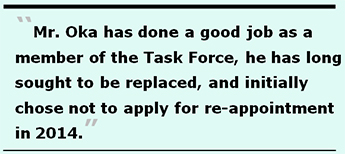 Then,
newbie Ethics Commissioner Peter Keane — professor of law
and Dean Emeritus at Golden Gate University Law School, who was
appointed to the Ethics Commission by his pal, City Attorney Dennis
Herrera, hoping Keane will do Herrera’s bidding, and was
sworn in as an Ethics Commissioner on October 21, 2013 —
also quickly argued on May 28 to change the closed-session meeting
noticed on the published agenda into a suddenly open-meeting agenda
item that the public had not been notified they could attend,
if interested.
Then,
newbie Ethics Commissioner Peter Keane — professor of law
and Dean Emeritus at Golden Gate University Law School, who was
appointed to the Ethics Commission by his pal, City Attorney Dennis
Herrera, hoping Keane will do Herrera’s bidding, and was
sworn in as an Ethics Commissioner on October 21, 2013 —
also quickly argued on May 28 to change the closed-session meeting
noticed on the published agenda into a suddenly open-meeting agenda
item that the public had not been notified they could attend,
if interested.
Keane appeared not all interested in hearing the Deputy City Attorney’s advice to the Ethics Commission to postpone and re-calendar the agenda item to a future meeting. Keane sought to ignore the City Attorney’s advice, and wanted the Ethics Commission to discuss the item without adequate public notice, also right there on the spot like Commissioner Paul Renne.
Commissioner Keane peppered Recreation and Park Department’s Sara Ballard — who had been dispatched to attend the Ethics hearing in lieu of her boss, Phil Ginsburg — with questions. Ballard defended Ginsburg by asserting that RPD had relied on City Attorney Dennis Herrera’s Good Government Guide to redact information that should have been provided to the Sunshine complainant. Remarkably, Keane stated “The Good Government Guide is an advisory document. It has absolutely no force of law.”
Finally, we have an admission from an Ethics Commissioner that Sunshine advocates have asserted all along: The conflicting information and legal misinformation presented under the guise of “legal advice” in the Good Government Guide cannot trump either the California Public Records Act or San Francisco’s Sunshine Ordinance! Hopefully, this will be the beginning of the end of City officials withholding public records by claiming their legal advice came from the Good Government Guide, that Keane admits has “no force of law.”
Luckily, Ethics Commission president Ben Hur ruled to continue the agenda item to the Commission’s June meeting.
SOTF’s “Disabled” Member Requirement and Incumbent Bruce Oka
Although Mr. Oka has done a good job as a member of the Task Force, he has long sought to be replaced, and initially chose not to apply for re-appointment in 2014. He appears to some observers to now be providing cover to the Supervisors who implemented the Purge of Task Force members in 20112.
n July 2013, Oka was invited to re-apply to the SOTF and was provided an application form Supervisor Chiu’s legislative aide, Judson True. Mr. Oka replied on July 12, 2013 that he was not going to fill out the application since he didn’t want to continue serving on the SOTF.
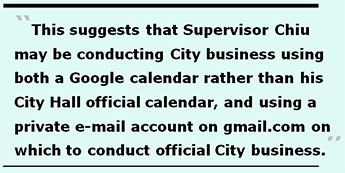 The
attached table shows extracts from 14 e-mails Oka exchanged
with Chiu’s aide, Judson True, over the course of 2013 asking
to be replaced on SOTF. Notably, Oka asked at least eight times
to be replaced on the Task Force, and asked to be replaced ASAP.
Oka had met with True as early as February 2013, just four months
into his appointment to the Task Force to discuss Task Force “matters
ASAP.” It’s not known whether Oka had expressed to Mr.
True as early as four months into his Task Force assignment a
desire to be replaced.
The
attached table shows extracts from 14 e-mails Oka exchanged
with Chiu’s aide, Judson True, over the course of 2013 asking
to be replaced on SOTF. Notably, Oka asked at least eight times
to be replaced on the Task Force, and asked to be replaced ASAP.
Oka had met with True as early as February 2013, just four months
into his appointment to the Task Force to discuss Task Force “matters
ASAP.” It’s not known whether Oka had expressed to Mr.
True as early as four months into his Task Force assignment a
desire to be replaced.
The e-mails exchanged were obtained by a strong Sunshine advocate who placed a records request to Supervisor Chiu on May 16, the day after the Rules Committee had only forwarded the three recommendations for Pilpel, Todd David, and Fischer to the full Board of Supervisors. Mr. True, responded to the records request by attaching the e-mails on May 27.
It’s clear from these e-mails that Oka doesn’t want to serve on the Task Force any longer. Elsewhere there are reports Oka may be planning to resign from SOTF by the end of the 2014, before the term expires in April 2015. To that extent, Oka appears to be re-applying for an appointment he doesn’t really want, and in the process is blocking the appointment from going to someone who really does want to be appointed: Namely, Mr. Bruce Wolfe.
Notably, as early as July 23, 2013, Supervisor David Chiu e-mailed Supervisor Mark Farrell, asking Farrell:
The candidate Chiu was referring to was Kate Williams. Ms. Williams had e-mailed Chiu at Chiu’s private e-mail address on gmail.com. Attached to the e-mail was a one-line entry from a Google calendar showing an entry for a meeting between 3:30 p.m. and 3:45 p.m. on April 11, 2013 that read: “RSVP: Kate Williams, Sunshine Ordinance Task Force — Office.”
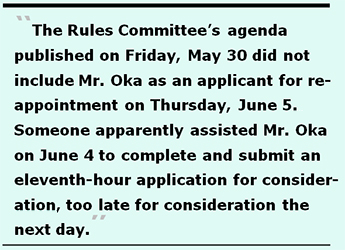 It
is not known whether the Google calendar was from Ms. Williams’
Google calendar, but observers suspect it was more likely a calendar
entry from David Chiu’s Google calendar, given that it notes
“Office” as the meeting location. This suggests that
Supervisor Chiu may be conducting City business using both a Google
calendar rather than his City Hall official calendar, and using
a private e-mail account on gmail.com on which to conduct official
City business.
It
is not known whether the Google calendar was from Ms. Williams’
Google calendar, but observers suspect it was more likely a calendar
entry from David Chiu’s Google calendar, given that it notes
“Office” as the meeting location. This suggests that
Supervisor Chiu may be conducting City business using both a Google
calendar rather than his City Hall official calendar, and using
a private e-mail account on gmail.com on which to conduct official
City business.
Since Oka is, in fact, a holdover on the SOTF, and the term of appointment to seat #11 will only run through April 2015, many observer’s find it unacceptable that he threw his hat into the ring seeking re-appointment only the day before the June 5 Rules Committee hearing since there are reports he may plan to resign from the SOTF before the end of this year.
Oka wound up on the Task Force in 2012 only after Mayor Lee was unwilling to re-appoint him to an SFMTA transportation committee. There may have been no surprise there, as Oka may have irritated the Mayor over one MUNI issue or another. It appears to have been up to the Mayor to make a formal nomination to re-appoint Oka to the SFMTA committee, and up to Supervisor Chiu to move it forward, but neither of them advanced Oka’s clear interest in an SFMTA re-appointment.
At the time, the Mayor rudely didn’t have the courtesy to inform Oka beforehand that he had not been re-appointed to the MTA committee. Oka learned of it only when he showed up for an MTA meeting and found the new appointee sitting in his chair. Observers wonder how Oka might continue to believe that magically the Mayor may somehow change his mind and re-appoint Oka to the MTA committee he wants to serve on, the very committee Lee had unceremoniously thrown Oka off.
Surprisingly, although the Rules Committee’s agenda published on Friday, May 30 did not include Mr. Oka as an applicant for re-appointment on Thursday, June 5, someone apparently assisted Mr. Oka on June 4 to complete and submit an eleventh-hour application for consideration, too late for consideration the next day, given restrictions on modifying the agenda at the start of the Rules June 5 hearing.
It is unclear why Oka would have submitted — or who talked him into submitting — an application for re-appointment just 24 hours before the scheduled hearing, after Oka has begged for almost a year to be replaced and relieved of his Task Force appointment, leading some to speculate who may have pressured Oka into submitting a last-minute application, and why.
Many observers believe the honorable thing for Oka to do is to officially withdraw his eleventh-hour June 4 application on Monday, June 9 so that Mr. Wolfe can be fairly considered for a seat that he clearly wants, which Oka clearly doesn’t want.
Oka has served admirably on the Task Force, despite his clear requests to David Chiu since at least July 2013 — nearly a year ago — to be replaced. It’s time Oka move on.
It’s highly unlikely that
Supervisors Katy Tang and Norman Yee did not
know of Oka’s repeated appeals to be replaced on the Task
Force.
 Because Mr. Oka has
long been a reluctant “holdover,” the failure to appoint
a willing and qualified applicant like Mr. Wolfe is indefensible.
Because Mr. Oka has
long been a reluctant “holdover,” the failure to appoint
a willing and qualified applicant like Mr. Wolfe is indefensible.
Indeed, during the public comment
period on June 5, Mr. Oka testified that he believes Bruce Wolfe
should be picked by the Rules Committee and recommended to the
full Board of Supervisors to fill the Task Force’s disabled
seat. Oka’s recommendation of Wolfe for the seat doesn’t
appear in the closed captioning transcript posted on SFGOV TV,
perhaps because he used the wheelchair-accessible alternate microphone,
not the microphone at the speaker’s main podium. But Oka’s
endorsement of Wolfe is clearly audible on the audio recording
and in the video recording posted on SFGOV TV.
As well, Supervisor Campos supported the application of Bruce
Wolfe during the June 5 Rules hearing, stating, in part:
Campos testified that he thought it was important to move forward Bruce Wolfe’s application that day, on June 5.
Unfortunately, despite the endorsements of Bruce Wolfe by both Supervisor Campos, and Bruce Oka, Supervisors and Yee stubbornly refused to consider Wolfe on June 5. Instead Tang and Yee prevailed on a motion to continue consideration of Seat 11 (for either Oka or Wolfe) to a future meeting. Lamely, they moved consideration for Seat 11 to the Call of the Chair or a date-certain date, and then qualified it to say they’d consider the continued item “within the next two meetings,” which could lead to another one- to two-month delay before completing appointment recommendations for both Seats 4 and 11. Yee and Tang are expert at stalling.
Following the Rules Committee’s June 5 hearing, Oka gave this reporter permission to approach Supervisor Tang to tell her that the only reason Oka had applied the day before was because he was led to believe Supervisor Yee wanted multiple candidates for each vacancy, and Oka had applied solely for that reason, but wants off of the Task Force.
Oka also requested meeting with Ms. Tang prior to June 10, which Tang confirmed following the hearing that she’s open to doing. We’ll have to see if Tang brow-beats Oka into remaining an applicant, despite his insistence he doesn’t really want to be re-appointed to the Task Force, or whether Tang will honor the wishes of Mr. Oka without brow-beating him.
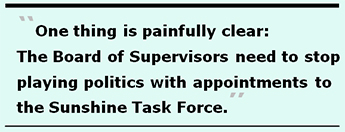 Conclusion
Conclusion
How is it that Ethics Commissioners can openly seek to ignore City Attorney “advice” using an alternative interpretation of law and advice presented during an open meeting, but the Sunshine Task Force is held to a different standard?
If Supervisor Katy Tang’s new litmus test is designed to exclude appointees who don’t support City Attorney advice, does that mean the Board of Supervisors will stage a coup, and purge the Ethics Commission of appointees like Renne and Keane who appeared all too willing on May 28 to ignore City Attorney advice?
If not, isn’t that a double standard? Can one oversight body — Ethics Commissioners — freely and openly ignore City Attorney “advice,” while another quasi-judicial body — SOTF — cannot, and is held out for retribution and punishment? How might this double-standard play, in, say, Peoria?
Does Supervisor Tang have different “litmus tests” in play for different City oversight bodies? With some appointees being purged from their seats due to litmus tests, while others are not? Or am I missing something in the mixed messages being sent from City Hall?
How does this double-standard play with Supervisor Scott Wiener? Is Wiener OK with Keane and Renne ignoring DCA “advice,” but simultaneously holds SOTF to a different standard?
One thing is painfully clear:
The Board of Supervisors need to stop playing politics with appointments
to the Sunshine Task Force, and let Task Force members get on
with their job of adjudicating disputes between citizens and City
officials who skirt the Sunshine Ordinance.
Monette-Shaw is an open-government accountability advocate, a patient advocate, and a member of California’s First Amendment Coalition. He received the Society of Professional Journalists-Northern California Chapter’s James Madison Freedom of Information Award in the Advocacy category in March 2012. Feedback: monette-shaw@westsideobserver.com.